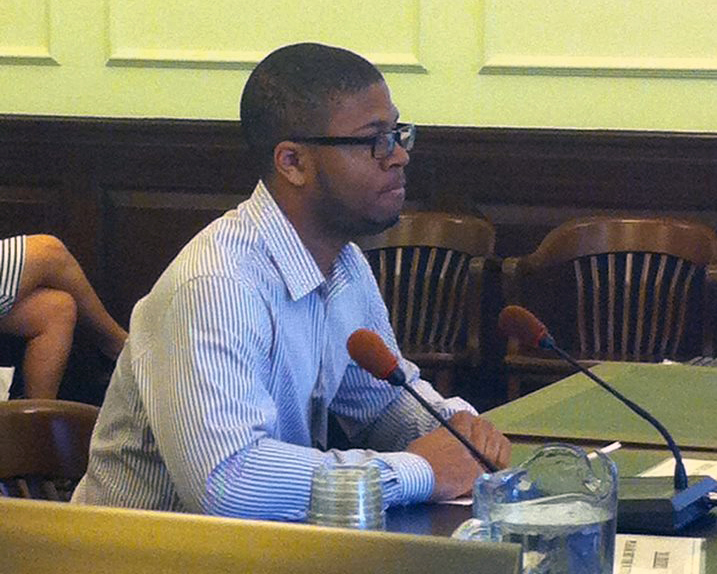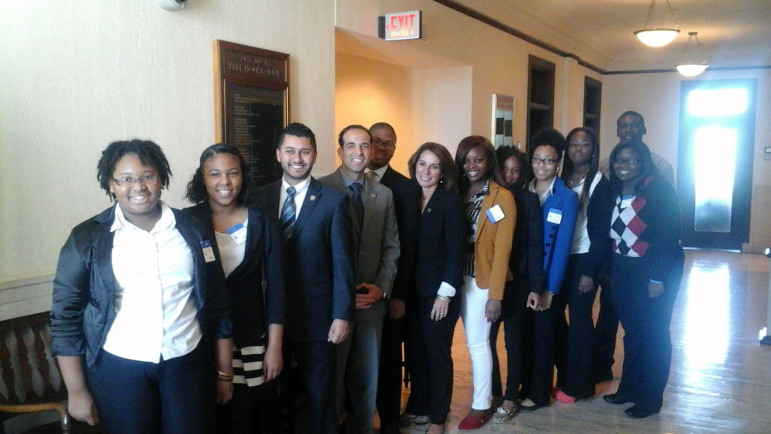
Photos courtesy of boys & girls clubs of hudson county
Jordan T. testifies in Trenton, New Jersey, before the New Jersey Senate in support of legislation making it possible for teens to seek mental health care without parental consent.
Jordan T. was 16 years old when he tried to see a mental health care professional to help him resolve “issues” at home. It tormented him, he said, and he needed someone to talk to, but Jordan said his mother would not consent, as state law required, to allow him to see a mental health professional.
“In my house I had a lot of issues going on,” Jordan said. “Then, we were at a field trip at a medical center, and I realized I needed help. But when I tried to go into therapy, my mother refused, so that’s where a lot of the idea [to change the law] came from.”
It used to be in New Jersey that if a teen, 16 or 17 years old, had a mental health care issue, the parent would have to consent for the teenager to be seen by a licensed mental health care professional. But on Jan. 19, New Jersey Gov. Chris Christie signed a teen-inspired bill that removed that requirement for a teenager in distress. The teen no longer needs a parent’s consent.
It happened all because a teen in need got busy with his peers in an after-school group and they worked to change the law.
New law in New Jersey
Jordan, now 19, belonged to the Boys & Girls Clubs of Hudson County. The teens there started to research the law. Jordan said they did not know enough to be discouraged by the bureaucracy, like so many others who have gone before a state legislature and run into a maze of legal requirements.
“I don’t think there was a time where we said this is really hard,” Jordan said. “In the beginning, we didn’t know exactly what the process was, which was one of the blessings about doing this. We learned so much about the process of changing a law.
“It was motivational for the group. We were just proud of ourselves that we were even able to think of something like this.”
At each step, Jordan and his peers, who called themselves “The Griffins,” reminded themselves that their effort could change somebody’s life, maybe save somebody’s life.
According to the latest Centers for Disease Control and Prevention Youth Risk Behavior Survey of youth grades nine through 12 in 2013, 17 percent of high school aged youth reported seriously considering suicide. Eight percent attempted suicide. In fact, the CDC reports suicide is the second-leading cause of death for young people ages 15 to 24.
“The Boys & Girls Clubs of Hudson County was on-board from the very beginning,” said Janet Wallach, director of program development and teen services for the Boys & Girls Clubs of Hudson County. “After the youth gained the support of Assemblymen (Carmelo) Garcia and (Raj) Mukherji, he was completely supportive and assisted the [teens] in sending out letters and setting up a conference call with other leaders in Boys & Girls Clubs throughout the state to enlist support for the vote in the Assembly.”
In June 2015, Jordan and his peers — 20 teens — had gone through the fastidious steps of getting a bill up for a vote in New Jersey, which included drafting the words of the bill, nonpartisan legislative research by a state agency, two readings in front of committees and an early committee vote. Then the teens had to testify in front of a second committee of the state legislature.
“In a typical legislative hearing, you have aides whispering in the legislators’ ears, you have rustling of papers, you have side conversations. But in the committee hearings where our kids testified, when they stepped up to the microphone, there was dead silence,” Wallach said. “Every single person paid attention to our kids. It was amazing.”
The bill, which was called the “Keystone Law,” was passed by the New Jersey Senate in June 2015, but in November, Gov. Christie said he would not sign the bill unless the age was raised from 13 to 16, allowing minors the right to mental health care without parental consent. The bill was reworded raising the age, and Gov. Christie signed the bill into law.

The NJ Assembly hallway, the first time the Keystoners travelled to Trenton (state capital) for the first committee hearing and testimony. Jordan (with glasses)is standing slightly behind Assemblyman Garcia in the shadows
“The youngsters gave heartfelt testimony about their very difficult home lives,” said New Jersey state Sen. Diane Allen. “It gave me a real look at the kind of situation in which some children find themselves. I came to realize this legislation could potentially help young people like those who testified, so I ultimately voted in support of the bill.”
Wallach said the new law requires the New Jersey Department of Children and Families to have information on its website as well as printed materials to distribute to all behavioral health facilities and licensed professionals free of charge. The law covers children 16 to 17 years old and pertains just to mental health care services. It does not include a proviso on payment for services, or where the youth can get the services.
National perception of need
Abigail English, the director of the Center for Adolescent Health & the Law in Chapel Hill, North Carolina, said that in 2010, 34 states allowed, in some fashion, minors to seek mental health care outpatient treatment on their own. New Jersey’s new law means there are at least 35 states now, but English is not sure how many states still require parental consent for mental health care. Each state has its own law on minor consent.
According to the U.S. Department of Health and Human Services, despite the fact “half of all mental health disorders show first signs before a person turns 14 years old, and three quarters of mental health disorders begin before age 24,” less than 20 percent of young people “with diagnosable mental health problems receive the treatment they need.”
Kevin Ellis, a program director at the YMCA Teen and Youth Development Center in east Atlanta, said laws allowing teenagers access to mental health care by their own volition are necessary because some of the teenagers’ parents come from a do-it-yourself background.
According to Georgia law, minors must have parental consent for mental health treatment.
“We’ve had dads and moms who did not want to admit there was an issue,” Ellis said. “The parent will say, ‘Nobody stepped in for me when there was an issue,’ and ‘This is how we handle things.’ I have had a dad tell me that he and his child will work through an issue on their own.
“Fixing an issue with somebody else’s help can be hard to accept. It’s not how some parents came up.”
Ellis said parents who are reluctant to seek a mental health professional for their teenager can have the perception that seeking third-party help is a poor reflection on them as a parent.
Ellis said counselors at the Y are not trying to replace the parent, but he thinks it would be a good idea for teen after-school centers to have a bulletin board full of verified mental health resources that teens can access on their own.
“There are just some things these kids don’t want to tell their parents,” Ellis said.
Providing access to care
English, at the Center for Adolescent Health & the Law, said after-school centers need to be careful about what they post about minors’ rights to mental health care. It can be difficult deciphering the law in different states.
“It is very tricky because so many young people are dependent on electronic communication and learning about things online. Sometimes people put information together with the best intentions in the world, but it really is not accurate,” said English.
“If information is going to be included in a flyer, or website or bulletin board, it should be reviewed by a local lawyer who can say this is accurate,” said English, who is a lawyer. “Certainly trying to find mechanisms to make this information generally available to young people is really desirable, and maybe you can use a flyer or bulletin board to do this.”
The door to treatment can be opened in other ways, too, not just with bulletin boards and electronic media. School nurses are a prime example, but so are coaches of after-school sports teams, and the physicians who do exams prior to athletics or other extracurricular participation.
“That professional may pick up on the fact this is a young person that seems to be upset about something,” English said.
“There are opportunities where young people interact with health professionals, not necessarily a mental health problem, per se, where they could be informed this [seeking help on their own] is something they are able to do.”
Jordan could not describe the feeling of elation when New Jersey was added to the list of states where teens can access care for themselves.
“It is something that is very exciting, I don’t even know what words to put to something like accomplishing this,” he said. “One of the best things is that we have been able to be an example to other youth around, and be change agents. It’s a law that needed to be changed and now other youth have seen we have done it.”































